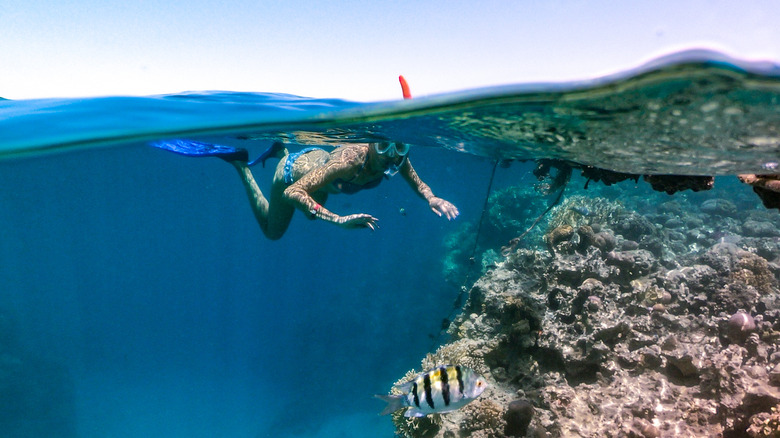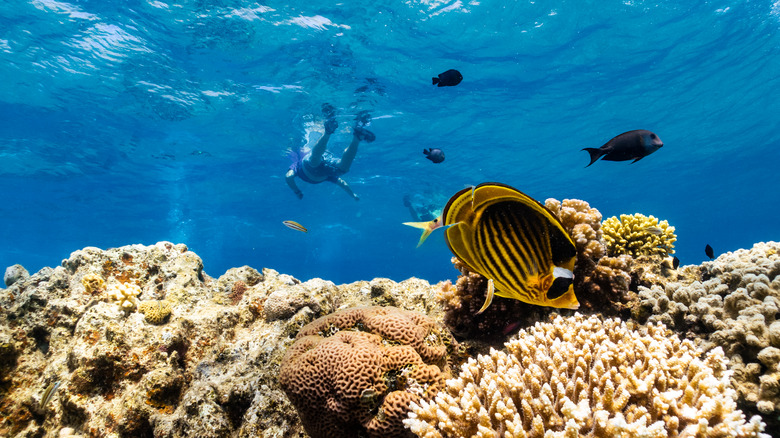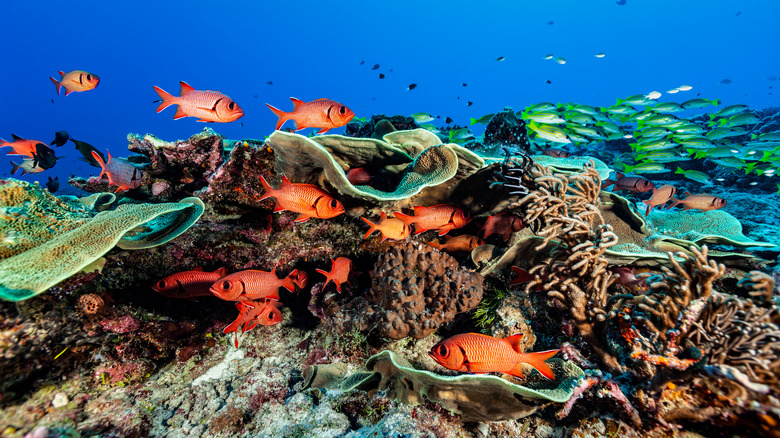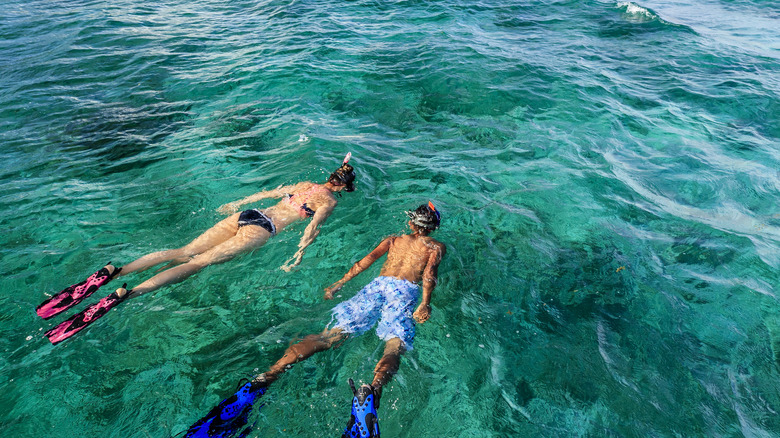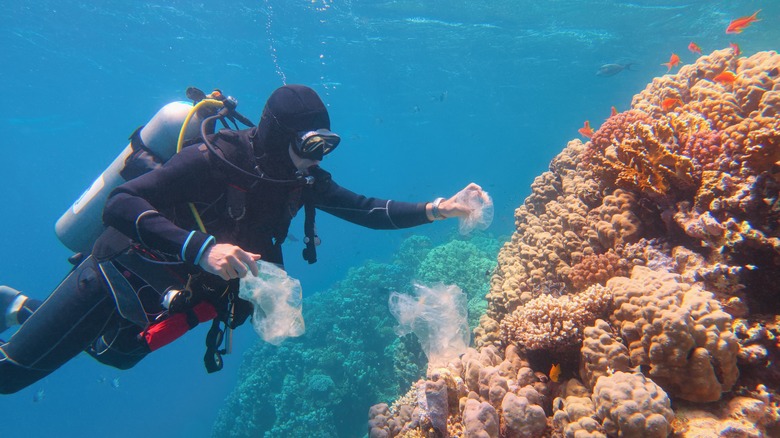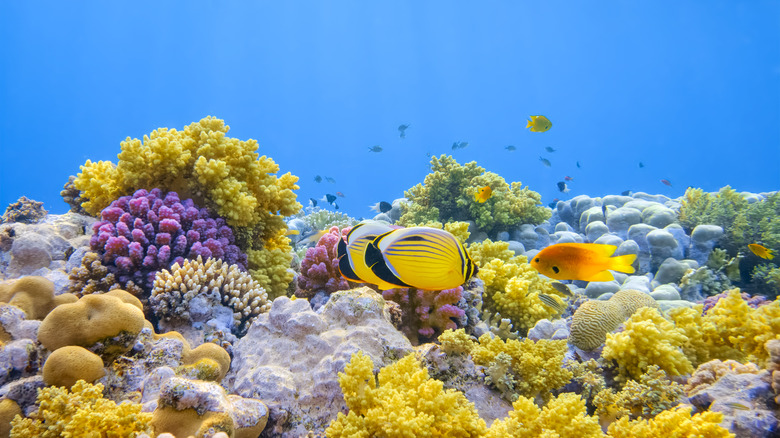How To Safely Snorkel Around Coral Reefs
Coral reefs may be the most fascinating type of ecosystem on planet Earth. Bursting with life, these intensely biodiverse regions below the sea's surface can be home to thousands of species at a time. There's no better opportunity to see the many vibrant creatures in our oceans than snorkeling over a coral reef – but bad practices can mean that even visitors with the best intentions can damage this incredible community of underwater animals.
The best thing you can do for coral reefs before you even hit the ocean is to ensure you're the best snorkeler you can be. The time to master your skills is not while you are already in the ocean, directly above a vulnerable marine environment. You'll need to be able to float horizontally in the water and swim forward without using your arms. If you're struggling with this, you can use a buoyant snorkel vest to help you stay stable. Make sure to test it, along with all your other gear, before you head out for the reef – the last thing you want is to find out your mask is too tight, your fins are too loose, or you have loose straps hanging off you once you're in the water.
Don't touch the reef
Snorkeling puts you within arms reach of another world, where beautiful creatures different from ourselves live their whole lives below the waves. As tempting as it might be, however, it's vital that visitors not touch any of the corals or animals in the reef. Snorkelers sometimes break corals and damage the reef unintentionally by kneeling or standing on it to take a break. Even curious snorkelers touching the corals can be a problem. While it might seem harmless, this ecosystem is fragile, and disrupting it because of a passing urge to reach out and grab something just isn't worth it.
As good as your intentions might be, you can unintentionally touch the reef if you aren't paying attention. Accidentally kicking the reef while swimming would be bad, but you should also try not to disrupt the sand on the seafloor, as it can settle back down on the corals, keeping them from getting enough light. Keep an eye on your gear, too. It's just as disruptive to the reef to be repeatedly touched by dangling hoses as human hands.
Don't disrupt the animals
When snorkeling over a coral reef, your goal should always be to observe the environment in its natural state. That means doing your best not to disrupt how any creatures around you live their lives when you aren't there. This provides you with a unique opportunity to see the usually hidden natural world under the ocean as it really is and keeps marine animals safe.
The easiest thing you can do is not intentionally touch, pick up, or feed any animals you see while snorkeling. Even small interactions with these shy animals can be stressful for them, and while one person stroking one fish as it darts by will not necessarily harm the coral reef, the more people interact with these animals, the more their natural behaviors are changed.
For instance, animals that humans regularly feed lose their fear of them, which can put them in harm's way. You should also do your best to maintain a reasonable distance from the reef – and any animals swimming around you, even if they approach you. When possible, move slowly and deliberately to avoid startling them. This is particularly important regarding larger animals you might encounter while snorkeling, like sharks.
Don't introduce harmful chemicals to the reef
Many people's first instinct when going to the beach is to reach for the sunscreen. However, you may want to think twice about applying basic sunscreen before going scuba diving or snorkeling. While it's important to keep your skin safe from the sun's rays, it's also important that you do not accidentally introduce any harmful chemicals to the reef.
Sadly, many sunscreens contain oxybenzone and octinoxate, which studies have shown may kill new corals. While this testing has been done in a lab environment rather than in the actual ocean, it's relatively easy to avoid this issue by not exposing the reef to these potential hazards at all.
If you think you'll need sunscreen, choose one which is biodegradable. Many products specifically advertise that they are "reef-safe" or "coral-safe," and while there isn't enough research to be 100% sure that these products are harmless to marine life, it's worth the extra few dollars to buy a bottle that is less likely to do harm.
Leave the reef cleaner than you found it
While the typical guideline is to leave the coral reef exactly how it was before you came, there's one way that you can leave it better than you found it. You should never pick up anything you find in a coral reef and take it home, but there's one key exception: litter. If you spot a plastic bag caught on the corals or a soda bottle bobbing around in the waves, you should grab it and take it back to shore. Some snorkelers bring a bag with them to collect any trash they find while exploring the reef.
You should always take litter that looks like it just hit the ocean, but if something looks a little older, take a closer look before grabbing it. As sad as the idea of human garbage cluttering the ocean is, sometimes it's too late, and it has already become a part of the environment. If an animal is living in the trash, you'll have to leave it there.
Consider how your entire trip affects the reef
For some, snorkeling at a coral reef is a once-in-a-lifetime experience. For others, it's a business. Companies that run snorkeling trips bring new people to the reef every day. While your impact on the reef during your visit is typically small, these companies have the power to do serious damage to coral reefs or protect them, depending on their practices. Among the many things you'll want to consider before booking a snorkeling tour on your dream vacation to the Caribbean is whether that company does everything it can to preserve these ecosystems rather than exploiting them for profit.
It can be tricky to know if a company is ethical, especially because many "greenwash" or attempt to appear more sustainable by using earth-friendly sounding buzzwords on their promotional material. An excellent way to check for yourself is to see if they promote harmful practices in their ads – like showing pictures of snorkelers holding sea creatures. If they have regulations that encourage positive snorkeling behavior, like banning harmful sunscreens, that's a good sign. They should also have a section detailing how they moor their boats, as anchors can seriously damage corals. You can contact the company directly and ask what they do to preserve the reef. Any ethical company should be happy to tell you.
